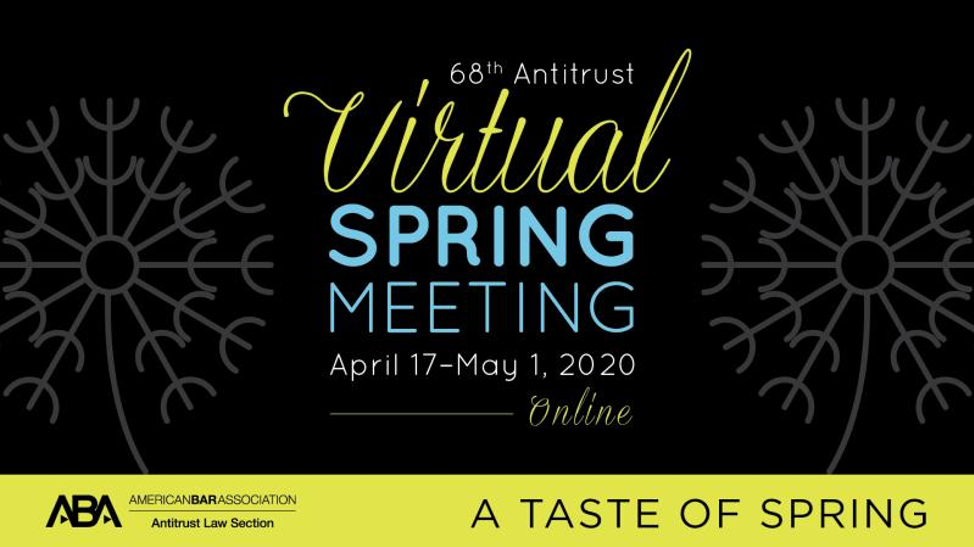As mentioned in a previous blog post (here), the ABA Antitrust Section is hosting the 68th Antitrust Virtual Spring Meeting with programs in different formats—podcast, live stream, etc. Full information from the ABA about the program which runs from April 17-May 1, 2020 is available here. This is a wonderful way the Section has put its hard work in preparing for the Spring Meeting to good use, and we are the fortunate recipients.
I’ve posted a link below to the podcast “Whatever Happened to Global Cartel Enforcement?” which premiered Monday, April 20, 2020. This is a tremendously experienced group of speakers covering North American, Europe and Asia. The panelists have both present and former government experience, including outstanding DOJ Antitrust Division experience. I enjoyed the program and I think you will too. SPOILER ALERT: Global Cartel enforcement is not dead.
This is the program announcement:
ABA ANTITRUST SECTION SPRING MEETING PODCAST RELEASE: WHATEVER HAPPENED TO GLOBAL CARTEL ENFORCEMENT?
Presented by the Cartel & Criminal Practice Committee
Until recently, global cartel investigations dominated the headlines, and it seemed clear that coordinated international enforcement would be the wave of the future. But with the recent decline in blockbuster investigations, many question whether this trend has played itself out and, if so, what lies in store.
Session Chair/Moderator:
Brent Justus, McGuireWoods LLP, Richmond, VA
Speakers:
Heather S. Nyong’o, WilmerHale LLP, San Francisco, CA
Lisa M. Phelan, Morrison & Foerster LLP, Washington, DC
Marisa Tierno Centella, Deputy Head of Unit Cartels, European Commission, Brussels
Atsushi Yamada, Anderson Mori & Tomotsune, Tokyo
To listen to the podcast, click here.
**************************
I’d like to add one comment to the discussion. On the question of “Why international cartel prosecutions are down,” it was suggested that years of tough enforcement by the Antitrust Division, USDOJ and other jurisdictions may well have increased deterrence to the point where fewer companies/individuals are willing to risk the consequences of being caught in a cartel. The global business community has been educated about the illegality of cartels, probability of being caught and severe consequences of price fixing. This deterrent effect is undoubtedly true…or at least we hope so.
I think, however, that strong deterrence has had another “educational” consequence. Those that do enter into a cartel, do so much more carefully. Gone are the days when detection was not on the minds of anyone (except possibly Americans) and cartel agreements were freely discussed in memos, emails and files (electronic and otherwise) were full of hot documents. Executives today that do enter into international cartels undoubtedly are quite familiar with the possibility of simultaneous dawn raids/search warrants being executed around the globe. “Cleaner” files reflect the realization that instead of writing “Delete after reading” at the end of a “hot document,” such documents should not be created in the first place.
The “careful cartelist” has contributed to a decrease the number of international cartel leniency applications that are being submitted. Being more careful may mean that company counsel never learns of the participation a cartel. But suppose counsel does learn of a cartel problem, for example, during a potential merger review, or as the result of an internal hot line complaint. There will be internal debate about whether to seek leniency. The debate is surely different if counsel is aware that hot documents litter the files of cartelists worldwide or whether the conspirators have been much more careful. Of course, counsel cannot know for sure what documentary evidence exists, but it is likely there is far less today than say 15 years ago. It is a given that the collateral costs of seeking leniency have gone way up with the increased worldwide enforcement by governments. Equally concerning to a potential applicant are class action suits, and these are not just brought in the United States today. Companies considering leniency must weigh the cost of seeking leniency against the chance of detection if the company does not self-report. It is possible, and I think likely, that fewer potential leniencies are reported because counsel (or clients) surmise (whether correctly or not) that the chances of prosecutors detecting the cartel, or even if detected, successfully prosecuting the cartel, have diminished as cartel activities have become more discreet.
This brings me to my favorite subject—the benefit of a criminal antitrust whistleblower statute. The United States needs an SEC style whistleblower statute to encourage individuals to self-report. Individuals, of course, face their own set of negative collateral consequences if they become a whistleblower, so the need for some possible monetary award is crucial. I won’t repeat the arguments laid out in previous blog posts (here) (here) about the benefits of a criminal antitrust whistleblower statue. But the need for “insiders” becomes greater as cartels become more covert. With respect to leniency, one benefit is that fear of a potential whistleblower would go into a company’s decision of whether to seek leniency. Even if there already has been a whistleblower to start an investigation, a corporate leniency is likely still available and companies are much more likely to see leniency when a credible investigation already exists. .
Note: There currently is a form of whistleblower reward—if the victim of a price fixing/bid rigging scheme is the federal or state government. See, “Whistleblowing and Criminal Antitrust Cartels: A Primer and Call for Reform.” And with over $2 TRILLION in federal aid being rushed into the economy, the possibility of criminal antitrust fraud seems likely. A whistleblower can file a qui tam suit alleging the government has been defrauded of money and if successful, be rewarded with an award that can range from 15-30% of the government’s recovery. See for example, DOD Bid Rigging Whistleblower and Related Antitrust Division Criminal Cases”
Thanks for reading.
Bob Connolly bob@reconnollylaw.com

